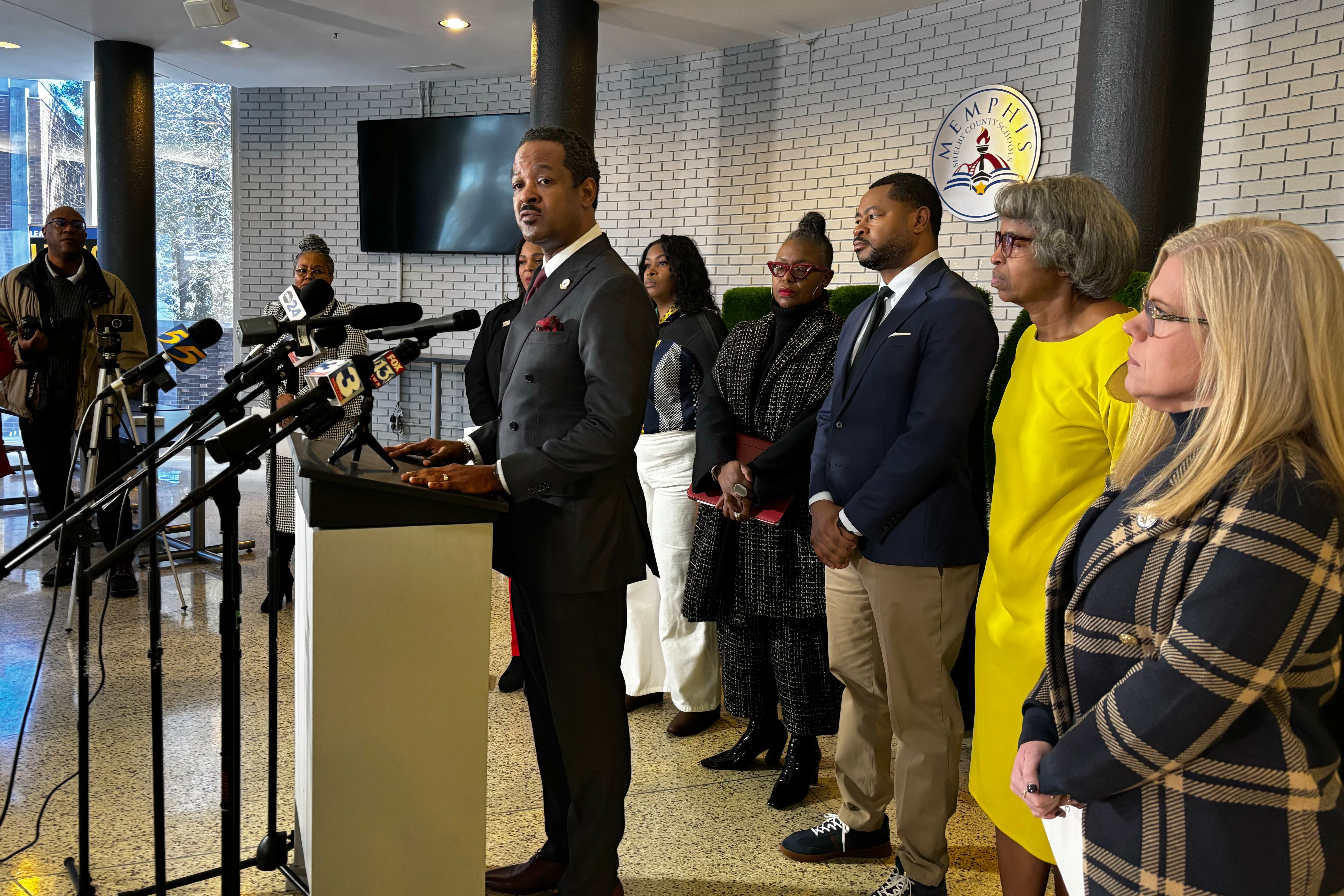Two days after firing Superintendent Marie Feagins, Memphis-Shelby County Schools board members sounded themes of unity and collaboration Thursday but said little about what the search for a permanent superintendent would involve.
At a press conference attended by seven of the board’s nine members, Board Chair Joyce Dorse Coleman said she believes the district is “turning a corner,” while interim Superintendent Roderick Richmond expressed interest in the permanent role and promised a 100-day plan.
“We are committed to working collaboratively with the interim superintendent to ensure a smooth transition, clear priorities and an unwavering focus on student success,” said Dorse Coleman, who introduced the resolution to fire Feagins. “Our job is to provide support, oversight, and guidance to ensure that our district moves forward in the right direction.”
The board voted 6-3 in a heated meeting Tuesday to terminate Feagins’ contract less than 10 months into her tenure, citing professional misconduct and dishonesty. A report from a board-hired outside lawyer found Feagins violated her $325,000-a-year contract and deviated from board policy and that she exhibited a pattern of untruthful statements
Feagins, who did not speak at Tuesday’s special meeting, previously denied any wrongdoing and described herself as a target of “false accusations and political maneuvering.”
Before answering questions from the media, Dorse Coleman said the board was limited in some responses because of potential litigation from Feagins. Feagins told reporters after Tuesday’s vote that board members had chosen “litigation over leadership” and that she would see them in court.
Richmond, a 30-year district administrator, promised to deliver a 100-day plan focused on stability, providing necessary resources to schools, and reaching out to elected officials and stakeholders to improve those relationships. Asked by a reporter whether he has interest in becoming superintendent permanently, Richmond said: “Yes, I do.”
Richmond applied for the permanent role in 2023, but he did not make the finalist list. He previously had been a finalist for superintendent roles in Nashville and Jackson, Tennessee.
In response to questions about possible state intervention — a state lawmaker has suggested adding state-appointed board members — Richmond said he hopes it does not come to that. He said his past work involved constant discussions with the state on directives and that he’s prepared to speak with those elected officials.
“I believe I am the right person at the right time to do this most important work for our school district and our community,” Richmond said. “I ask the community to trust me, to trust our board members, to trust our leadership teams, to trust our principals, to trust our teachers, to trust that we can get this right and we will do it right, to move our school district and community forward.”
In an acknowledgment that the board has work to do itself, Dorse Coleman said board members Stephanie Love and Natalie McKinney will provide a board governance training plan to the district by Feb. 10. Four board members who were elected last August already are scheduled to receive state-required board training next week, a spokeswoman said.
Outside the press conference, Feagins supporters chanted “We will not back down” and held signs with messages like, “They chose chaos over children.”
Board members Michelle McKissak, a fierce advocate of Feagins, and Keith Williams, who voted to fire Feagins, did not attend the press conference.
Board member Amber Huett-Garcia, who voted against the firing and introduced a failed counter-proposal to keep Feagins, attended and spoke about the need for accountability and strong governance.
“Each day we spend not focused on children is a mistake,” Huett-Garcia said.
While her colleagues spoke mostly about the future, board member Towanna Murphy revisited the allegations against Feagins and the decision to fire her.
“For nearly nine months, we exercised patience, we have given grace, we have allowed time for adjustments, progress, and course of correction,” Murphy said. “But our responsibility as board members is not to sit back while our district suffers. It was time for us to act.”
Board members said they are not sure if the next superintendent search will be national in scope. But Dorse Coleman told Chalkbeat that the next leader does not have to be from Memphis.
“They can be from wherever,” she said. “We just want somebody that has the same interest — to care about educating our children and working collectively with the school board.”
A contract for Richmond has not been finalized, board members said. Richmond joined MSCS in the 2013-2014 school year and has held many roles, including as executive director of student support services, chief academic officer, and co-chair of a steering committee that assisted the city-county school district merger.
In June, Feagins appointed Richmond to the new position of transformation officer. The role focuses on turnaround efforts for schools rated “D” or “F” by the state, and oversaw athletics, discipline hearings, and readiness for college.






